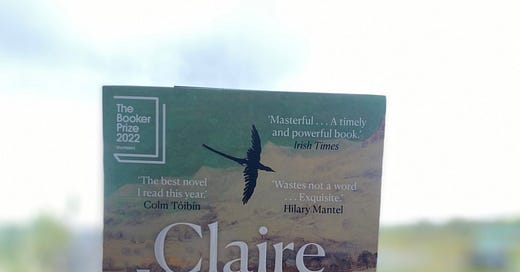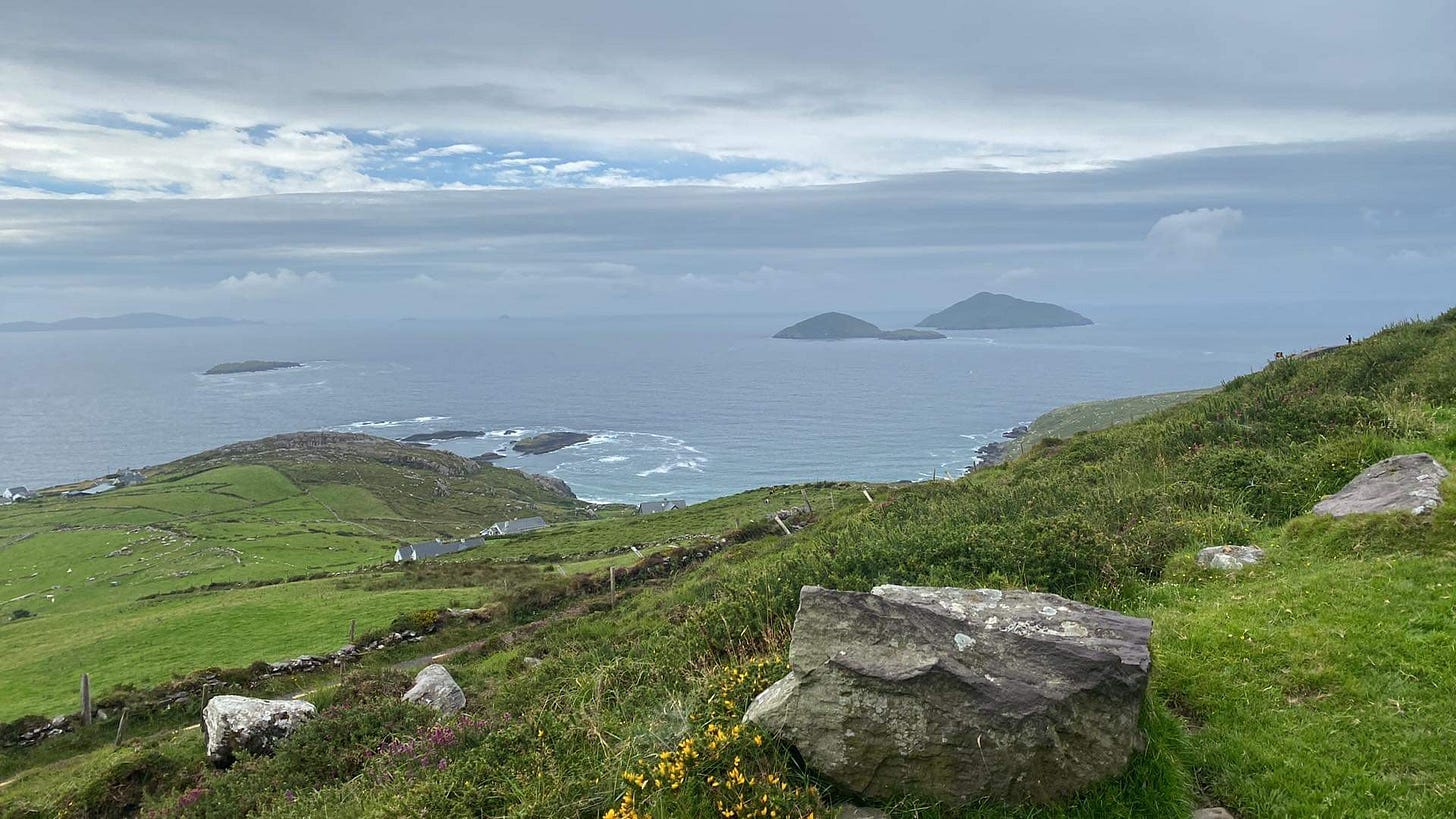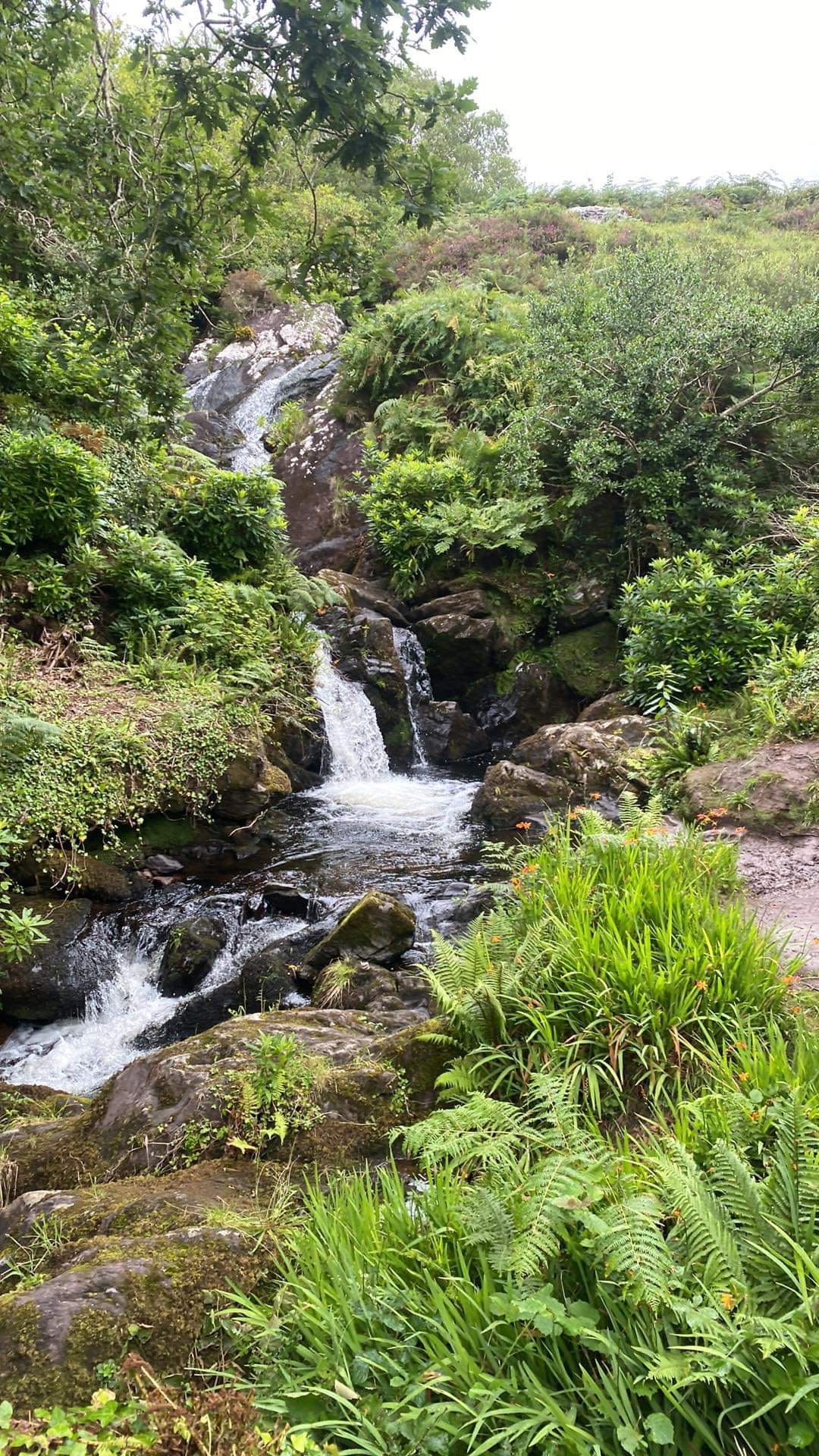“They tried to bury me. They didn’t realise I was a seed” - Sinéad O’Connor
Day 5 and Day 6 of hiking the Kerry Way in Ireland with Mum. Cahirsiveen to Waterville to Caherdaniel.
I’ve not been sure how to write today but I’m doing it anyway. I’m here, out of the rain, in the Blind Piper in Caherdaniel. This place has the best food I’ve had in Ireland so far. I’m jabbing rapidly with finger and thumb at the light box between my hands as mum surveys the local art work on the walls and waits for our apple tart and ice cream to arrive (we are sharing it).
Three hours in the middle of the night last night I lay awake in Waterville, plagued by a terrifying image conjured in my mind’s eye by the beautiful, sparse prose of Clare Keegan’s gut-wrenching book ‘Small Things Like These’. It’s the moment when Bill Furlong finds the girl left in the coal shed behind the convent.
I read it on our rest day, mostly in the comfort of Lazy Cat Cafe in Cahirsiveen, which is a great place run by a group of very resourceful Ukrainian people who have escaped the war. The lovely bookseller at Quirke’s in Cahersiveen had told me to read it. He wasn’t wrong. As I paid, I noticed was wearing a T Shirt that says: ‘A book is man’s best friend outside of a dog’. I said I liked what it said on his shirt. He said, “Did you read all of it?” I hadn’t. In small writing at the bottom is says ‘it’s too dark to read inside of a dog - Groucho Marx’.
It occurs to me, having been so affected by the book he sold me, that being a bookseller or a librarian is to do some kind of wizardry - literally putting ideas inside others’ minds. You’re orchestrating their mood and thematic thought patterns. (The same can be said for English teachers and writers and, well, OK, to a varying degree, everyone who can use language. What is language but magic spells?).
The sense of the waking nightmare I’d had stayed with me when we got to Waterville and didn’t really shift until we reached this lovely place called Cahirdaniel on foot this afternoon. It wasn’t that I hadn’t known about the scale of abuse of women and girls here before. I suppose there’s always fresh realisation that comes and goes, the waves of awareness and oblivion. I feel it keenly today, it’s heightened by thinking about Sinéad O’Connor, by reading the Keegan book, by being here in Ireland at this moment in time.
At least 10000 girls and women had their lives ruined by the Catholic priests and nuns who ran the Magdalen laundries. As is now well documented, the Catholic church made huge amounts of money, often selling children abroad. They didn’t close some of the laundries until 1996. Even today there are still some incredibly harsh orders across Ireland and around the world, like Poor Clare’s. It reminds me of the Kumari - the little girl I glimpsed in Kathmandu in 2019, named as the living goddess and locked in a palace. Once she reaches puberty, she’s cast out and considered ruined.
The feeling of the weight of horrors of Ireland’s history, and particularly how women have paid such a price all in the name of religion, was on my shoulders, much heavier than my backpack. The dreadful sense that some women were buried so deep by their abusers that we may never even know they’re down there.
I read that Sinéad O’Connor was punished as a child by being forced to spend the night with a ward of abandoned Magdalen girls who’d become old women by then- they’d been sent away by their families for being pregnant out of wedlock and never allowed home again.
I was glad to be out in the fresh air and walking again this morning by 9.15. I shuddered walking past the old church in a way I don’t normally. Following the little yellow Kerry Way man was a relief and climbing the hill helped to lift our spirits as well.
The greenness of the grass covered in bright orange montbretia that comes originally from Africa suits Ireland so well. We turned to look back over Ballinskellig. We summited the hill to some more wonderful views and it was warmer and kinder on this new side. The Derrynane Bay curved out in front of us. It was a beautiful walk down towards the bay, like a jungle trek. So much variety today and we can do hills now without stopping, our bodies have adapted.
We had about an hour walking in the rain at the end before we got to our home for the night. Blue gingham curtains. My name was written up on the chalk board. It reminds me of somewhere me and El stayed in Taormina, years ago. It’s the quaintest place we’ve stayed, it’s a sweet country cottage turned hostel with no pretensions.
We have walked about 60 kilometres so far and have about the same amount to go. We can imagine getting to the end now.
The horror of seeing the girl in the coal shed, and the many she stands in for, will continue to haunt me. But with her comes the dream of the good man that would help her, like Bill helps Sarah. It’s the ‘small things like these’, the brave, often unwitnessed acts of kindness that redeem us.
Fiction gives us that sense of a possible resolution which is harder to pin down in life. The walk is another story we are telling ourselves, to give ourselves the sense of an ending. The sense that things can be completed, fixed, finished. And to distract ourselves from the things that can never be undone and from the things that we fear may never be healed.
Every once in a while a woman comes along who can transform enormous suffering to power, like Sinéad did in life and continues to do in death, and that gives me hope that we will walk on to brighter days.






